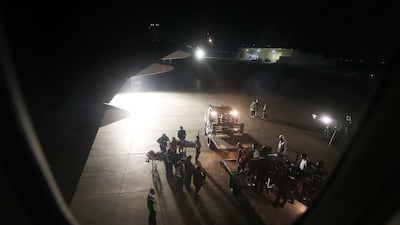Live updates: Follow the latest news on Israel-Gaza
When she boarded the Emirati flight, Esmat Abu Aqlan looked pale and exhausted after 10 weeks of relentless war in Gaza, but said she was happy that her husband, a prostate cancer patient, would receive the urgent treatment he needed in the UAE.
She had only learnt that she and her husband would go to Abu Dhabi the night before. They immediately borrowed winter clothes from their relatives and prepared a small bag to carry their essential items: documents and a sandwich that their daughter had made.
“I had to borrow this from my in-laws,” she said of her fluffy blue jacket. “We left our house while the weather was hot. We don’t have winter clothes.”
She was referring to how they had to evacuate their home due to Israeli shelling and move to what they hoped was a safer place.
Ms Abu Aqlan and her husband were part of a group of sick and injured Gazans and their relatives flown out of Al Arish to get treatment in the UAE, which has conducted six flights so far with the aim of flying out 1,000 cancer and 1,000 paediatric patients.
In Abu Dhabi, a sense of relief washed over the more than 100 Gazans as they landed at the capital's international airport on Tuesday, bringing them closer to much-needed medical treatment after travelling for nearly a day.
They were seen hugging members of various teams from the UAE government who helped carry their belongings and their children on to buses that would take them to a place of safety and comfort.

The flight from Egypt's Al Arish military airport had to stop over in Cairo for transit, where an Etihad Airways crew on board was swapped out.
About 20,000 Gazans have been killed since the war with Israel began on October 7. The medical sector has been almost completely destroyed.
During transit, Ms Abu Aqlan's husband slouched over, having difficulty finding comfortable seating positions. He kept saying: “I'm tired.”
He and his wife had come from Nuseirat in Gaza, where they had resided with relatives after being displaced “nearly 10 times”, Ms Abu Aqlan explained, from their home in Gaza city.
“We took a risk coming from Nuseirat to Rafah because the road was closed due Israeli shelling,” she told The National aboard the flight from Cairo to Abu Dhabi.
“We had only learnt that our names were on the list of people approved for evacuation the night before.”
She was worried – crying and shouting answers to questions doctors asked her as they tended to her husband. By then, he had been acting erratic, seeming more agitated than usual.
He had low sodium levels, was dehydrated and “just needed to sleep”, one doctor told The National.
Although happy her husband will receive the attention he needs in the UAE, Ms Abu Aqlan misses her three children at home.
She used a passenger’s phone aboard the flight to send them a message and tell them that she is OK.
“Hanin how are you; did you give your sister a hug?” she asked her daughter tearfully via audio message.
This is one of many more flights to come, said Maha Barakat, Assistant Minister of Foreign Affairs for Health.
“Today on board we have about 130 passengers, most of whom are patients. We have children with injuries from the war, conditions that couldn’t be treated any more and adults with cancer. This is part of the UAE President’s pledge to bring in 1,000 children and 1,000 patients with cancer,” she told The National on the plane en route to Abu Dhabi.
“When they come to the UAE, they’re looked after in our hospitals in Abu Dhabi and we follow them up very regularly and visit them regularly. There really was no treatment for many of the conditions we’re seeing today and many of them would’ve died had they not come to seek treatment elsewhere.
“We’re hoping to have more flights in the coming days and weeks.”

Laila Abdelrahman is hoping for a new lease on life in the UAE for her 14-year-old amputee son, but said she does not know if she will see her children when she returns.
“I left a daughter, slightly older than my son Malik, 14, and a younger child. I left them with their 84-year-old father. They’re in a school, seeking refuge,” she said on board the plane.
“I don’t know whether they’ll still be alive when I return.”
Malik’s left arm had to be amputated after he was injured in an air strike on Al Nuseirat mall, where he was sheltering with his mother last month.

Ms Abdelrahman says she has never seen anything like this war before, despite living through several.
“They’re burying people alive. People are delirious.”
Originally a resident of the north, Ms Abdelrahman and her family were displaced six times.
She arrived at Rafah border crossing at 6am on Monday and boarded the plane to Abu Dhabi 18 hours later.
Despite near constant deprivation, she says there is not one single thing she has been craving.
“We’ve been deprived of so much, even a ripe tomato is a blessing.”




























